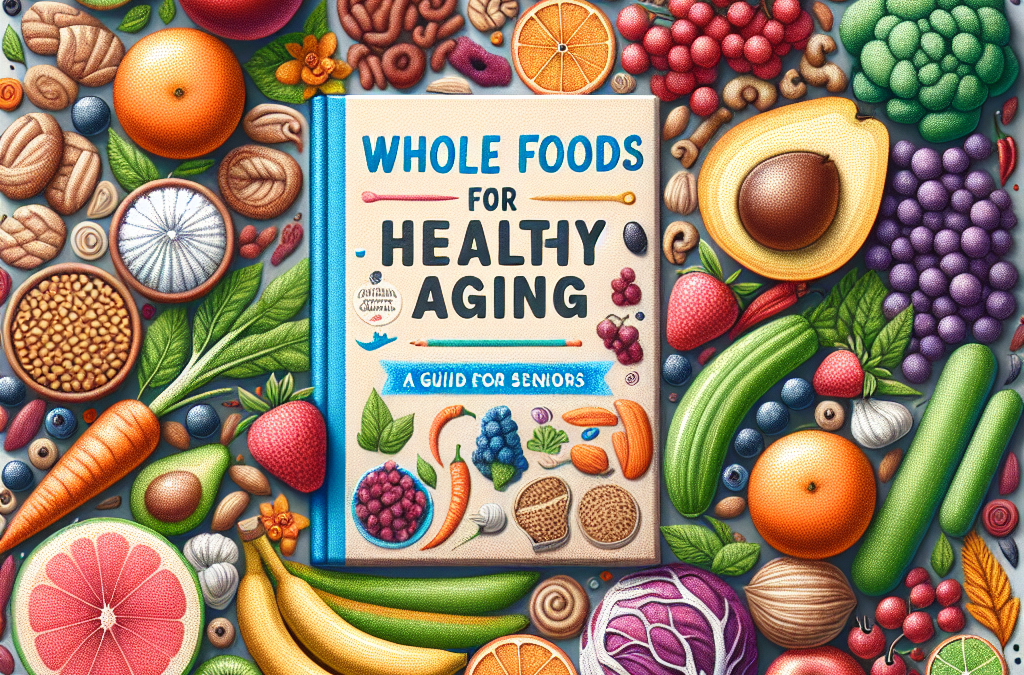Understanding Whole Foods
What Are Whole Foods?
Whole foods are basically foods that are as close to their natural state as possible. Imagine biting into a juicy apple or crunching on some fresh veggies—these are things you recognize right away, and that’s the beauty of whole foods. They’re packed with nutrients, minimally processed, and often taste way better than any pre-packaged snack.
When incorporating whole foods into your diet, think about vibrant colors and diverse textures. Let’s face it, a bright plate is so much more appealing! Think fruits, vegetables, whole grains, nuts, and seeds. Those are the real MVPs of a healthy diet.
Plus, these foods offer a myriad of health benefits. They’re loaded with antioxidants, vitamins, and minerals that not only help keep you feeling good now but also play a crucial role in aging gracefully. As I’ve settled into my golden years, I’ve found that eating more whole foods really makes a difference in my energy levels and overall well-being.
Benefits of Whole Foods
Health Benefits
The health benefits of consuming whole foods are hard to ignore. First off, they can help manage your weight, which is something that becomes more challenging as we age. Eating whole foods keeps you feeling full longer, thanks to the fiber content.
Not only that, but whole foods can also reduce the risk of chronic diseases. Conditions like heart disease, diabetes, and even certain cancers can be managed or mitigated by a diet rich in whole foods. I’ve witnessed friends and family experience significant health improvements simply by switching to a cleaner diet.
And let’s not forget about mental health! Eating well isn’t just about our bodies; it affects our minds. Foods rich in omega-3 fatty acids, like salmon and walnuts, have been shown to help boost brain function, which is something I definitely need as I navigate through daily life.
Top Whole Foods to Include
Fruits and Vegetables
Our first stop has to be fruits and veggies. The more colorful, the better! Each color represents different nutrients. For instance, leafy greens like spinach are high in iron, while orange veggies like carrots bring a healthy dose of beta-carotene.
Try to incorporate a variety into your meals. I often whip up smoothies packed with berries, bananas, and some leafy greens. It’s a tasty way to get a load of nutrients in one go! Plus, let’s be real; they can brighten up your day with their vibrant colors.
Remember, raw, steamed, roasted—they all count! Just experiment to find out what types you really dig. If you’re like me, you might find that a little seasoning can go a long way in making veggies appealing!
Incorporating Whole Foods into Your Diet
Meal Planning
Now that you know about whole foods, let’s chat about meal planning. This has been a total game-changer for me. When I sit down and plan my meals for the week, it helps me stay on track with my dietary goals. I can avoid those last-minute unhealthy choices when I’m starving and in a bind!
Get an Amazing Discount on the Best Certified Organic Whole Food Supplement!
Start simple. I usually plan for a few staple meals that I know I can whip up quickly. Think about batch cooking! Cooking larger portions to last a few days saves me time and makes sure I have healthy options right in the fridge.
I also try to keep a shopping list based on my meal plan to stick to the whole foods theme. This helps avoid the temptation of tossing random snacks in the cart that may not align with my goals. It’s all about making those healthier choices easier!
Staying Motivated on Your Healthy Journey
Finding Support
Staying motivated can be a challenge sometimes. This is where finding support comes in. Whether it’s friends, family, or a nutrition group, connecting with others can really help keep you encouraged. I’ve found that sharing recipes and tips with friends makes the whole experience fun and inspiring!
Join a community where everyone is on a similar mission to embrace whole foods for aging healthily. Having people around you can lighten the mood and hold you accountable. Plus, you’ll learn so much from different perspectives!
Don’t forget to celebrate your wins, big or small. When I hit a milestone, like incorporating new foods into my diet, I love to treat myself. It’s all about balance, after all!
Frequently Asked Questions
1. What are whole foods?
Whole foods are foods that are minimally processed and free from artificial ingredients. They include fruits, vegetables, whole grains, nuts, and seeds.
2. Why is it important to eat whole foods as we age?
Eating whole foods can help manage weight, reduce the risk of chronic diseases, and support mental health, all of which are crucial as we age.
3. How can I incorporate more whole foods into my diet?
One effective way is to meal plan. Stock your pantry and fridge with whole foods, and try to prepare meals in advance to make sure you have healthy options readily available.
4. What types of fruits and vegetables should I focus on?
Aim for a variety of colors and types. Leafy greens, bright orange vegetables, and a selection of berries are all excellent choices for nutrients.
5. How can I stay motivated to eat healthier?
Connect with others who share similar goals, celebrate your accomplishments, and keep experimenting with new recipes. Having a support system can make the journey enjoyable.





